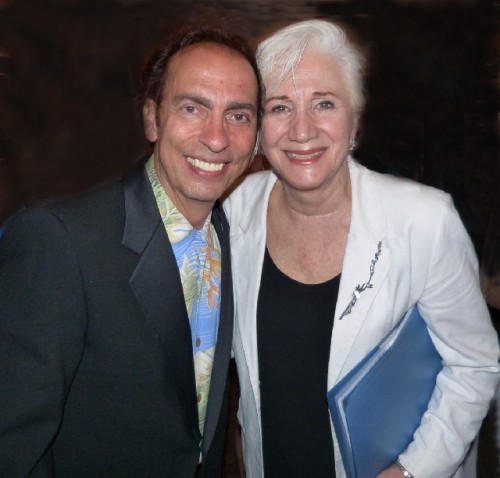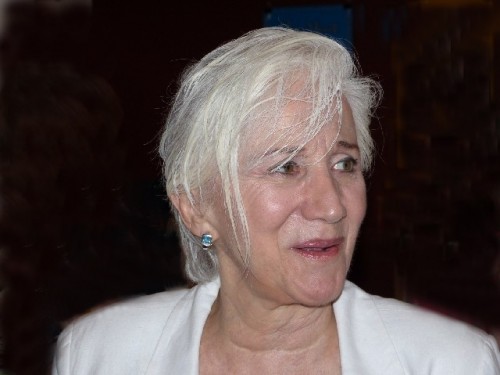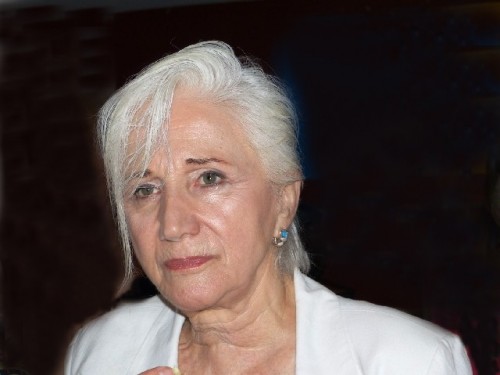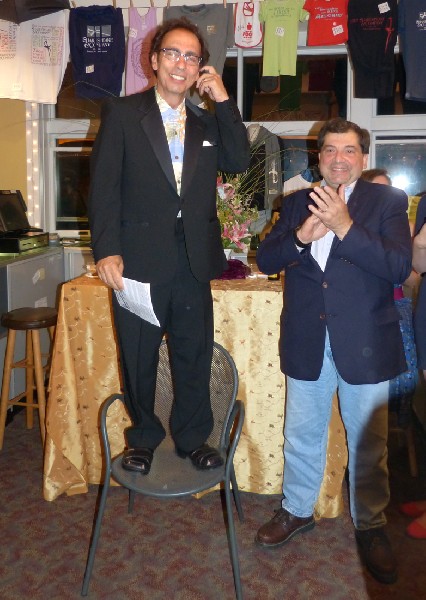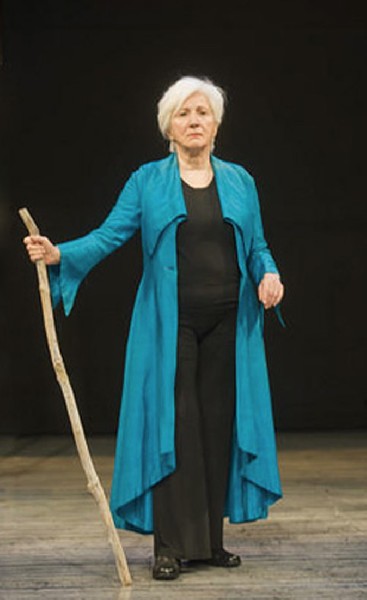Diva Olympia Dukakis as Prospera in The Tempest
A Clash of the Titans through August 19
By: Charles Giuliano - Jul 28, 2012
The Tempest
By William Shakespeare
Directed by Tony Simotes
Set Designer, Sandra Goldmark; Costume Designer, Deborah Brothers; Lighting Designer, Matthew E. Adelson; Sound Designer, Scott Killian, Choreographer, Barbara Allen; Dramaturge, Catherine Goodland; Voice and Text Coaches, Elizabeth Ingram, Malcolm Ingram; Production Assistants, Adam P. Blais, Leonard Luvera; Stage Manager, Diane Healy
Cast: Gregory Boover (Sailor/ Ensemble), Thomas Brazzle (Francisco/ An Officer), Timothy Douglas (Trinculo), Apollo Dukakis (Prospera), Johnathan Epstein (Stephano), Monica Giordano (Spirit), Stephanie Hodges (Juno), Merritt Janson (Miranda), David Joseph (Sebastian), Peter Macklin (Adrian), Casey McShain (Iris), Sam Perry (Sailor), James Read (Antonio), Thomas L. Rindge (Alonso), Rocco Sisto (Caliban), Ryan Winkles (Ferdinand), Kristin Wold (Ariel), Jennifer Young (Ceres).
Shakespeare & Company
Tina Packer Playhouse
July 19 - August 19, 2012
An over the top, high energy, often hilarious production of Shakespeare’s last play The Tempest (1610 he died in 1616) has been structured around the Tony and Academy Award winning actress, Olympia Dukakis, in the leading role of Prospero regendered (not without precedent) as Prospera.
She was ousted as Duke/ Duchess of Milan by her brother Antonio (James Read) and exiled to a remote island. This production is located somewhere in the Mediterranean circa 1939. She landed there with her then three year old daughter Miranda (Merritt Janson). Prospera in turn usurped the island from its only inhabitant the primitive imp Caliban (Rocco Sisto). The play occurs twelve years later when Miranda is a maiden of 15.
Prospera’s ouster from Milan occurred because she was more concerned with books than administration which she delegated to Antonio. When given just 24 hours to pack and leave she was assisted by Gonzalo (Apollo Dukakis the brother of Olympia) who secretly supplied her with rations, clothing, and precious books.
Through her scholarship Prospera is a master of the dark arts but more inclined to playful, positive, white than evil black magic. On the island she has indentured a spirit Ariel (Kristin Wold) who does her bidding with a promise to be set free. Prospera also uses her powers to enslave Caliban who despises her.
Learning of the proximity of her enemies returning from a wedding in North Africa she evokes a storm The Tempest that shipwrecks them on her island. She is intent on revenge but that morphs into forgiveness. But not before having sport with them through her agent Ariel and magical spells.
In the canon The Tempest is a singularly complex work. Because of its internal concerns with form and style for its own sake, as well as its date of creation at the end of the Renaissance, it falls within the historical and stylistic definitions of mannerism. This is art based on the Italian word maniera meaning "style" or "manner." Mannerism is notable for its intellectual sophistication as well as its artificial (as opposed to naturalistic) qualities.
Consider the fantasy and proto surrealism of the setting and actions of The Tempest. Then compare it to the Renaissance humanism and ersatz existentialism of Hamlet’s “To be of not to be” surely one of the first examples of ennui in literature. One might argue for Macbeth as medieval and a predecessor of the Gothic style that emerged with Mary Shelley’s Frankenstein (1818). Where then to place Goethe’s Faust (1806) or Marlowe’s Dr. Faustus of 1604 which seemingly conflate with aspects of The Tempest?
“We are such stuff as dreams are made of” Prospera states signifying a paradigm for an understanding of the play.
Recall the era from which it was spawned. In just three years, 1577-1580, Sir Francis Drake was the first to circumnavigate the world. Arguably, from that time on the sun never set on the British Empire. The isolated island nation was intoxicated by the exotic dreams that waft so deliciously through the Bard’s most whimsical and ephemeral play. Like the sprite Ariel it casts spells on audiences.
The British of the Elizabethan era, having eliminated its nemesis, Spain, in the Battle of the Armada of 1588, would now rule the waves. There would be no limit to greed or imagination. The first collections and eventually museums evolved from Wunderkammern or Cabinets of Curiosities. From the voyages of exploration specimens and species were collected by aesthetes. Eventually, these were organized as the South Kensington Museum later renamed the Victoria and Albert Museum with its clutter of curios.
Caliban is a curiosity or exotic specimen tamed by Prospera through religion and the mother tongue. Under Spain, for example, the Jesuits were conveyed to the New World in the ships of the Conquistadors. But the resentful and wild Caliban is vivid evidence that the best intentions do not yield optimal results.
While Prospera brings Christianity to the savage Caliban she also subdues and ensnares him with witchcraft. Luther tried and failed to rid Christianity of the idolatry of its heathen (Greco/Roman) sources. In England Druid elements of Celtic traditions conflated with Christianity. It would be denounced, particularly in the Colonies, as witchcraft and punishable by death.
In The Tempest Prospera functions quite nicely as a quasi Christian who is also a Druid priestess and sorceress. Heady stuff don’t you think?
The Tempest may be played and deconstructed in many ways. At American Repertory Theatre, some years ago during the Robert Brustein era, I saw a cerebral, abstracted, austere, avant-garde version of The Tempest.
Yesterday, I encountered a Tempest under director Tony Simotes which was played broadly for laughs. Particularly, the Three Stooges slapstick when Caliban teamed up with what he thought were two men from the Moon, Jonathan Epstein as Stephano, a drunkard butler to the King, and Trinculo (Timothy Douglas) a jester to the King.
Clearly Simotes, with a flair for farce, has sport letting the three chew the scenery and literally clamber all over the pipey set by Sandra Goldmark. The three are indeed hilarious particularly when Simotes has the Jamaican accented Douglas running around in circles.
This production works best when Simotes goes for broke with total gonzo mayhem. It’s all hands on deck, a double ration of grog for every man, roll out the canons, and string up the Jolly Roger.
The Tempest as Bali Hai. “…Your own special hopes, Your own special dreams, Bloom on the hillside, And shine in the streams. If you try, you'll find me. Where the sky meets the sea. Here am I your special island. Come to me, Come to me."
What then to make of the regal, imperious Dukakis as Prospera? At 81 Simotes can’t have his former professor jumping about like the rest of the cast and shimmying up and down the pipes. She proves to be light of foot, spry, game, and amazingly energetic. Her best lines, however, are delivered sitting down. On a wooden crate, a surrogate of a lost throne. Some of those speeches, particularly toward the end of the second act, were delivered in a stage whisper. We assumed that it was intended to draw us in and feel intimate. Although it was hard to hear the words we caught the drift.
Dukakis stands apart in this production which may be good or bad. Stories filtering out of rehearsals were that she had a mind of her own.
During the celebration in the lobby after the opening Simotes discussed expanding the role of dramaturgy. He suggested publishing notes from rehearsals and how a play evolves. His struggles with this wonderful diva would likely be a best seller. Often, in art, the process is as intriguing as the finished work. In movies we call it The Director’s Cut or the scenes put back in after losing battles with producers.
While all over the map this was a fun, fun, fun production of The Tempest. I’m just not sure that it’s how I think of the remarkably evocative play. For now, it is a treasure of the Berkshire season that we will ruminate over during the long winter to come.
As always, what’s wonderful about a Shakespeare & Company production is the ability to assemble casts where the most minor roles are played by actors who star in other productions. Simotes has made an all out effort to surround a grand lady of the theatre with an outrageously wonderful cast.
In particular, in addition to the previously noted Three Stooges (bravo, bravo, bravo), there was the tenderly told love story between an exquisite Miranda (Merritt Janson) and the ever amazingly whimsical and delightful Ryan Winkles as Ferdinand son of Alonso.
On that remote island with just her mother, and Caliban who attempted to rape her, the virgin Miranda has never even seen a man. She falls for the first guy she sets eyes on but with terrific and credible comic nuance.
In the end we have Tony’s Tempest with all that action and energy, played for laughs, and Olympia’s Tempest, featuring a regal, autocratic, complex, meditative, slow paced, deliberate Prospera. It’s a somewhat schizophrenic production where the director, Simotes, and star, Dukakis, prove to be separate but equal.
But, like those director’s cuts in film, you wonder what got left in the rehearsal room? Perhaps that’s the real Tempest. What audiences got to see was the calm after the storm.

